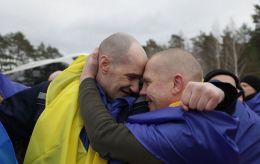Between two fires. Will Zelenskyy fire Zaluzhnyi, and what lies behind the conflict
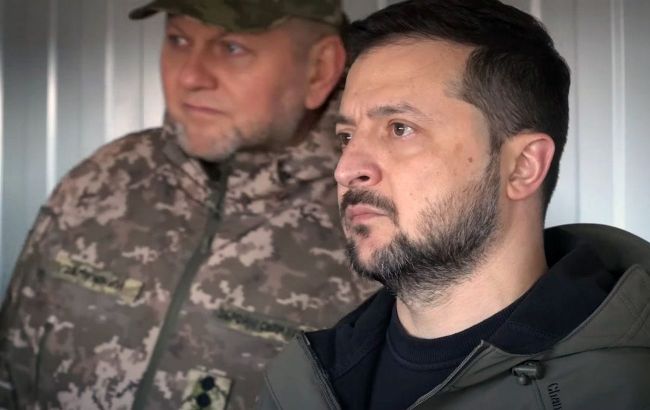 The story about the alleged dismissal of Zaluzhnyi may have a continuation (Photo: Facebook, Natasha Nesterova)
The story about the alleged dismissal of Zaluzhnyi may have a continuation (Photo: Facebook, Natasha Nesterova)
On Monday, information circulated on social media claiming that Volodymyr Zelenskyy was dismissing Valerii Zaluzhnyi. However, by the fourth day after this story broke, the presidential decree on the dismissal of the commander-in-chief did not appear. The reasons for the strain in their relationship, whether Zelenskyy will remove Zaluzhnyi from office, and who might replace him are explored in the material by RBC-Ukraine.
During the preparation of the article, public statements by Volodymyr Zelenskyy and Valerii Zaluzhnyi, data from sociological surveys by the Rating group, and comments from RBC-Ukraine sources in political and military circles under conditions of anonymity were used.
The possible dismissal of Valerii Zaluzhnyi became the unequivocal number one topic of the week. Numerous reports about the resignation of the general, as a fact that had occurred, were yet to be confirmed. However, discussions on this matter have been ongoing at the Presidential Office for quite some time.
The conflict between Zelenskyy and Zaluzhnyi was first mentioned in April 2022, just a few weeks after the start of the full-scale Russian invasion. "As soon as the Russians were pushed back from Kyiv, discussions began among us that 'Valerii turned somewhere wrong,'" says one member of the presidential team to RBC-Ukraine.
Soon, Zelenskyy had to publicly deny the conflict with the general. During a meeting with Ukrainian journalists, the president accused his political opponents within Ukraine of spreading such rumors.
On the same day, April 16, 2022, information emerged about Zaluzhnyi creating his charitable foundation to support the army. Although the foundation was quickly renamed, this story was interpreted as a sign of the general's political ambitions at the Office.
Especially since there was already a strong basis for this. Immediately after the full-scale invasion, the level of support for the Armed Forces rose to 98%, according to the Rating group's survey – even higher than Zelenskyy's personal support rating (93%). Zaluzhnyi, who was not particularly well-known on a broad scale before the major war, instantly became a popular figure of national significance.
Of course, Zelenskyy's team did not ignore this. Sources from various institutions and groups within the ruling team, the head of the Office, Andriy Yermak, was most actively pushing this topic.
As a result, unexpectedly having become a global star, Zelenskyy faced the presence of an even more popular figure in Ukraine. "There can only be one father of victory," and "There can only be one hero" – these phrases were repeated by various interlocutors, recalling the backstory of the current conflict.
Certainly, the figures of public approval immediately projected onto a possible schedule for future elections and drew alarming conclusions for the Office. Although neither then nor now does the conduct of elections seem like a top priority or practically possible, big politics returned to Ukraine just those days – in the first half of April 2022.
Conflict beginning
The tension between Zelenskyy and Zaluzhnyi first became public in the summer of the first year of the major war. The trigger was the disclosure of an internal General Staff document that required the military enlistment office's permission for the movement of military conscripts within Ukraine.
The document caused a significant resonance, and Zelenskyy promised to promptly resolve the situation and urged the General Staff "not to make such decisions without him." At the same time, the president, of course, denied any conflicts with the military leadership and emphasized the unity of the team. "I think this is nothing. Mistakes need to be corrected, that's all," Zelenskyy said at the time.
Since then, the topic of conflict in the military-political leadership of Ukraine began to regularly appear in Ukrainian, and later in foreign media space.
Suspicions that Zaluzhnyi harbors political ambitions only strengthened at the Presidential Office. Although the commander rarely appeared in the media, even this minimal activity irritated the Office. Moreover, practically any statement by Zaluzhnyi or even a simple selfie constantly caused a stir in the media and social networks.
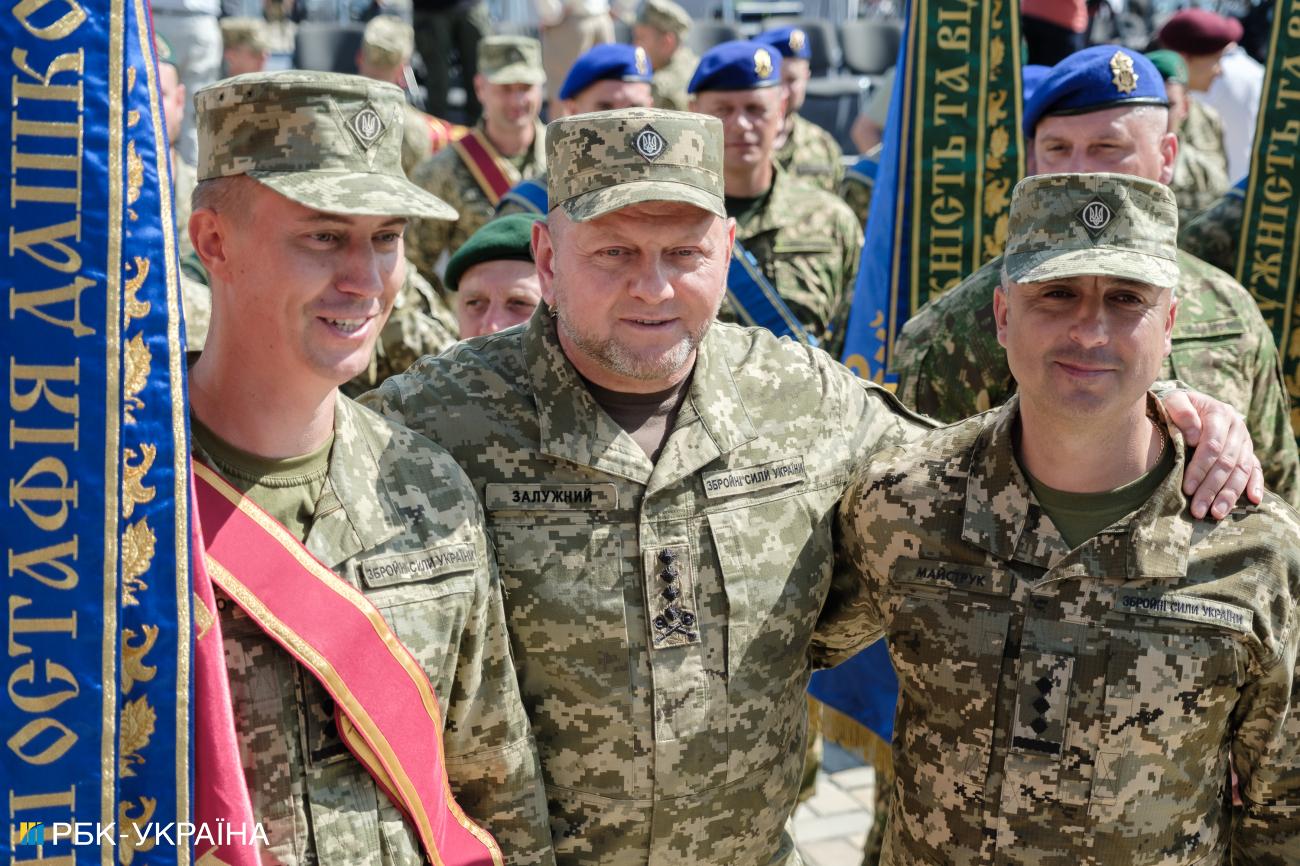
During the war, Zaluzhnyi became one of the most popular figures in Ukrainian society (Photo: RBC-Ukraine, Vitalii Nosach)
The president's inner circle was also concerned that around the general, in their opinion, "many Porokhobots" (supporters of former president Petro Poroshenko) had appeared. And anything related to the former president of Ukraine invariably triggered a sharp reaction at the Office.
There were other reasons for conflicts. One interlocutor in the military-political leadership recalls how, after some time after the full-scale invasion, Zelenskyy began to visit the front and personally communicate with brigade commanders and soldiers – while Zaluzhnyi remained in Kyiv for a long time (although, of course, no one demanded that the commander-in-chief personally lead people into attack). "Then the question arose: can the commander fully understand the real needs of people on the front if he does not communicate with them himself," recalls the interlocutor.
The general's entourage assures that Zaluzhnyi had and has no political ambitions, and everything else is purely the tactics of opponents. According to sources, at least until the end of the war, Zaluzhnyi's only task is to fight. He voiced this personally to people from Zelenskyy's team. However, as long as the initiative in the war was on Ukraine's side, all these problems did not reach a critical point. "If there were successes on the front now, everything would be normal," says one of the interlocutors.
The situation sharply escalated with the actual failure of the counteroffensive. The Office assures that the source of all optimistic forecasts was the generals' assurances of the operation's success, which they shared at meetings of the General Staff and in communication with Zelenskyy.
Later, the president and other top officials of the country broadcasted this optimistic narrative in the media. There, it was picked up by various experts and took on a life of its own. Until the reality won last summer when it became finally clear: there was no grand breakthrough of the Russian defense lines.
"Zelenskyy was very upset about it. When it comes to significant matters, like a counteroffensive, it naturally enrages when you're not being told the truth," the interlocutor notes. In response to RBC-Ukraine's remark that the Armed Forces of Ukraine did not receive everything necessary from the West for success, especially in the air, he replies, "And was it not immediately clear that the advantage in the air would be with the Russians? Why draw rainbow pictures?"
One of the sources assures that an agreement was reached sometime in late summer that Zaluzhnyi would no longer appear in the media and would focus exclusively on military actions.
On November 1, the renowned column by the commander-in-chief appeared in The Economist, along with his more detailed essay on why Ukraine cannot radically change the situation on the front in its favor at the moment and what it needs to do for that. It was perceived very sharply at the Presidential Office not only due to the violation of the agreement but also because of the content: Zaluzhnyi's narrative sharply contradicted Zelenskyy's narrative that the situation was by no means a stalemate. As a result, first, the Office, and then Zelenskyy personally, made critical statements about the general.
However, other sources in the security forces claim that there was no agreement between the commander and the Office regarding a ban on his media activity. Although during the big war, his interviews were indeed few. According to the interlocutors, permission for them was obtained from the Minister of Defense. As for the column in The Economist, its release was allegedly known, but its content was not.
This story added to the contradictions between the Office and the chief of the General Staff regarding the conduct of the war itself. Zaluzhnyi did not like that both the president and certain officials from the Office communicated directly with some commanders and generals, and sometimes their opinion prevailed or even contradicted the position of the chief of the General Staff.
"For over a year, Zaluzhnyi has not spoken face-to-face with the president – there was always someone else. And believe me, the president himself is very deeply involved in the war – I would say, even at the tactical level," says one of the informed interlocutors.
At the end of last year, the Office wanted the General Staff to present its vision of military actions in 2024. The military responded that they could provide such a plan if they understood the amount of funds – weapons and equipment – they could count on. These discussions turned into a vicious circle, which also left its mark on the relations - the Office demanded a plan to seek resources for the war based on it, while the General Staff said they could plan the actions only by understanding what they could work with.
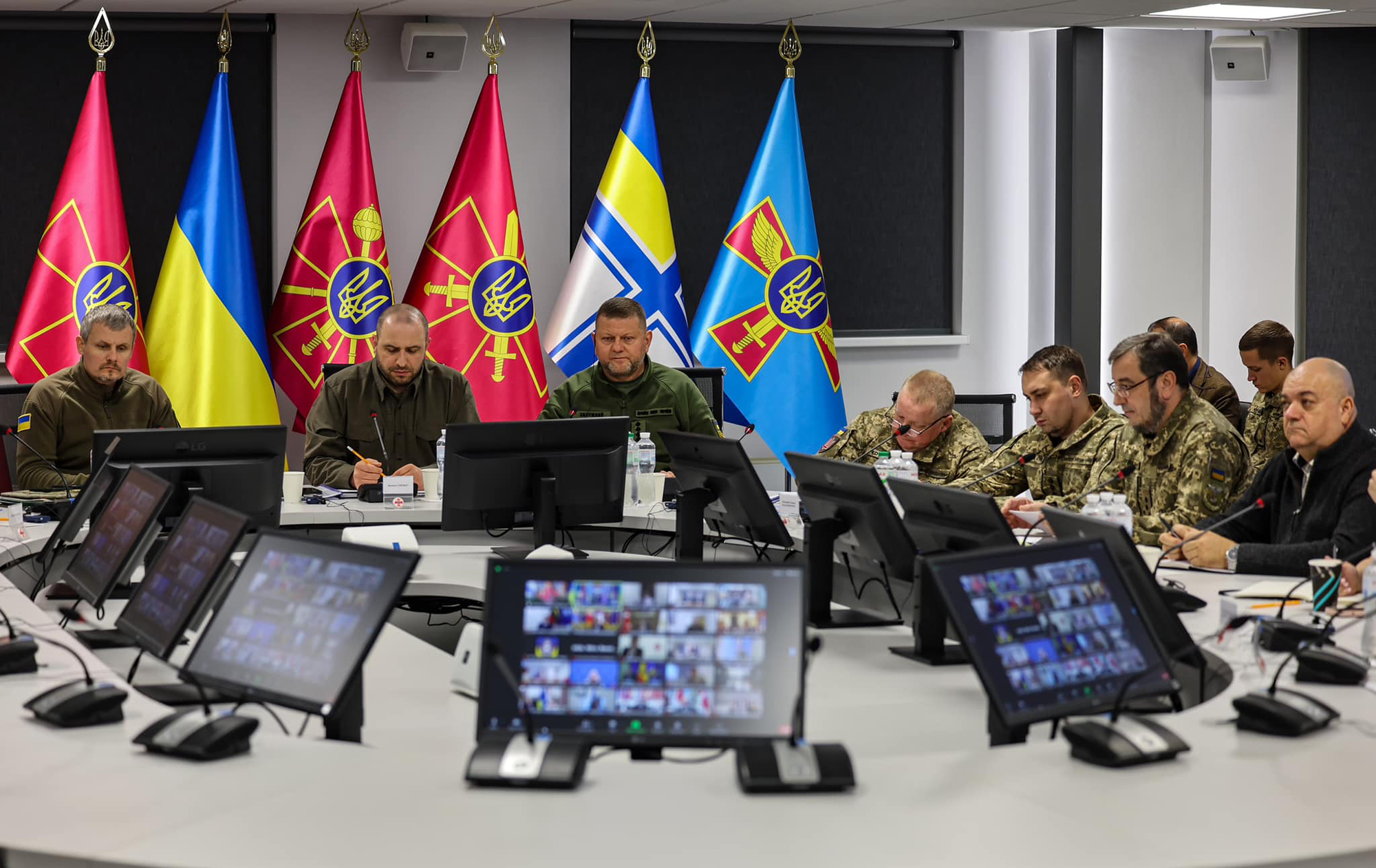
During briefings on war, the president did not always agree with the position of the general (Photo: Facebook, CinC AF of Ukraine)
Another source in military circles pointed out that the chief of the General Staff never participated in any negotiations abroad where the supply of weapons to Ukraine or the training of the Ukrainian military was coordinated. The source suggested that the Office may have imposed an informal taboo on Zaluzhnyi's trips abroad.
Tangled scenario
On Monday, January 29, Zaluzhnyi was summoned to the Presidential Office, where the President and Minister of Defense wanted to meet with him. During their conversation, Zelenskyy informed the chief of the General Staff that he should resign because he wanted to reboot the Defense Forces system. Discussions about significant reshuffles in the military have been circulating in the corridors for several months, but they remain just talks so far.
According to the information of the outlet, the president suggested that Zaluzhnyi take on alternative positions – either as Ukraine's ambassador to NATO or as Secretary of the National Security and Defense Council (NSDC) – a traditional practice used by the current government to, on the one hand, keep people within their circle, but in a relatively formal position. On the other hand, it avoids making enemies.
"We have a practice that everyone should resign on their own. If you didn't write a resignation letter yourself and were fired – that's it, you are the enemy of the people," says a source in the presidential team.
However, Zaluzhnyi refused to write a resignation letter or move to other positions. The chief of the General Staff and his team expected that by the night, the president would announce the same decision that the General Staff had suspected for the past few weeks.
Meanwhile, information about Zaluzhnyi's possible resignation leaked on social media. Several Telegram channels loyal to the Presidential Office wrote that the president's decree dismissing the chief of the General Staff would be issued soon. Several politicians and journalists, more aligned with Zaluzhnyi than the Presidential Office, published this information.
The employees of the TV marathon even received a recording of Zelenskyy's daily video address announcing the dismissal of the chief of the General Staff. However, the author who sent this video to journalists deleted it shortly afterward. Following the Ministry of Defense, the president's press secretary, Serhii Nikiforov, officially stated that the president did not sign the decree on the dismissal of the commander-in-chief of the Armed Forces.
There is no single version of what changed literally within a few hours on Monday. According to one version, the Presidential Office hoped that Zaluzhnyi would resign himself. But since he refused, the situation could develop into an unpredictable scenario for the Office. The chief of the General Staff would finally turn into a political superstar not constrained by any official position.
According to popular belief, Zaluzhnyi's dismissal will inevitably hurt Zelenskyy and his entire team's image. However, a source in the "Servant of the People" party believes that it will not be a catastrophe. "What will Zaluzhnyi's support transform into? There are no elections now. Maidan? What Maidan during the war? Moreover, Poroshenko will definitely come to this Maidan, after which many people will turn away from it due to his anti-rating," he believes. However, the image factor is unlikely to be completely written off.
According to another version, the Presidential Office supposedly still has not decided on the candidate for the new chief of the General Staff. The search for successors is a chronic problem of those in power currently. Sometimes, due to this, personnel rotations even at the ministerial level are delayed for months, or even years – and people with whom it was decided to part ways continue to stay in their positions.
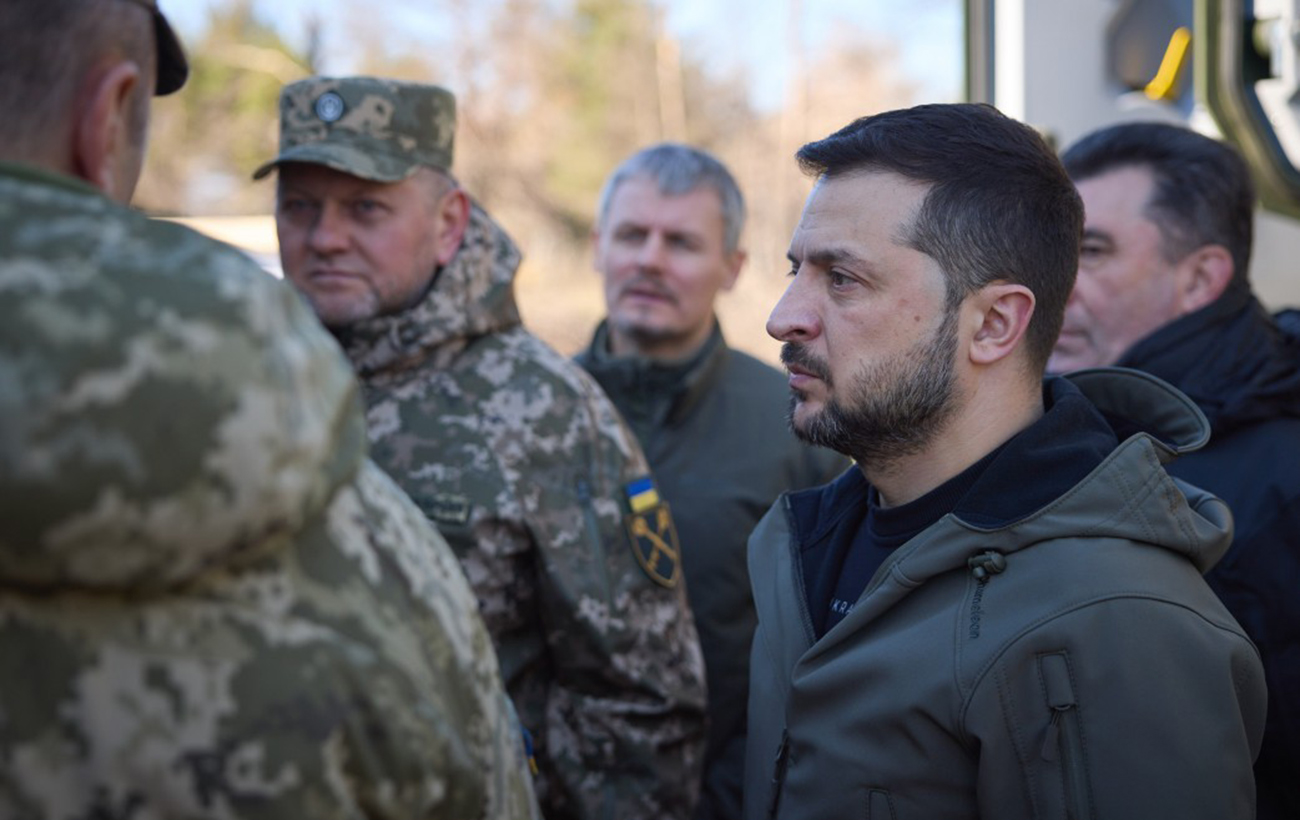
The Presidential Office may already consider candidates to replace Zaluzhnyi (Photo: president.gov.ua)
Currently, there are several possible candidates for this position - chief of intelligence Kyrylo Budanov and commander of the Army of the Armed Forces of Ukraine Oleksandr Syrskii. Both are lieutenant generals, known in Ukraine and abroad as well. Both are described as fairly tough military figures and both do not have particularly good relations with Zaluzhnyi.
The Budanov and Syrskii's surroundings say that they did not aspire to the new position. However, a source close to intelligence suggested that "if Budanov were offered such a proposal, as a military man, he has no right to refuse it." Another interlocutor close to the chief of intelligence confirmed that he was indeed offered the position.
As for Syrskii, opinions about his ambitions differ. Acquaintances claim that positions have much less weight than military successes and victories for him.
"He likes being in the field, conducting and managing operations; he lives for it. Besides, he is a wise person and understands that whoever takes the position of the head will inevitably be compared to the predecessor. And this comparison, one way or another, will not be in favor of the new head," considers one of the interlocutors in military circles. Others, on the contrary, believe that Syrskii would not mind promotion and has long wanted to take on the role of the commander-in-chief, like several other generals.
There is a widespread version that the dismissal of Zaluzhnyi failed due to the position of Ukraine's Western partners. However, it is incorrect to reduce this to the thesis "The West did not allow Zelenskyy to dismiss Zaluzhnyi." According to the RBC-Ukraine's information, concerns were indeed expressed by allies that the working methods of the potential new commander would be unclear to them, while they had already studied Zaluzhnyi well. However, the authorities claim that this is standard practice - in the case of high-profile dismissals, the West does not support the replacement of understandable people with new ones. And it asks to provide, unofficially, a real and clear reason for the dismissal (corruption scandal, poor performance, etc.). In the case of Zaluzhnyi, providing a valid reason is not so simple.
However, one influential interlocutor in military circles suggested that the Presidential Office could postpone Zaluzhnyi's dismissal until spring. On the one hand, this will allow the Office to monitor public reaction. On the other hand, it will serve as a vaccination for the population, making people think that Zaluzhnyi's dismissal is possible. And if the Office really dares to dismiss the general, in a month or two, then the public's reaction will be less painful than if they did it right now.
***
Most of RBC-Ukraine's sources lean toward the idea that the point of no return in the relationship between Zelenskyy and Zaluzhnyi has already been passed. The decision on his dismissal has been made, and the only question is about the timing. It could end in a matter of hours or a few weeks.



